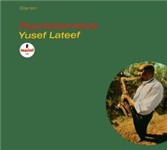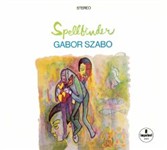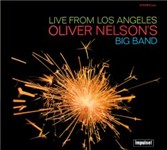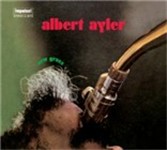Home » Jazz Articles » Multiple Reviews » Yusef Lateef, Gabor Szabo, Oliver Nelson and Albert Ayle...
Yusef Lateef, Gabor Szabo, Oliver Nelson and Albert Ayler: LPRs from Impulse!
 Yusef Lateef
Yusef Lateef Psychicemotus
Impulse!
2005 (1965)
Yusef Lateef had the misfortune of playing in a very crowded field of Coltrane and Dolphy enthusiasts and thus his records, which are always compelling and dynamic, tend to get ignored. Part of the problem may be that Lateef's records featured a kaleidoscope of styles that may have put off some listeners who wanted something they were able to pin down. However, eclecticism was always one of Lateef's strengths, one that he employs to good effect on Psychicemotus, another of his fine efforts for Impulse! Lateef and his quartet go from the skittish rhythms of the title track to a blues played on bamboo flute to an excursion into free jazz, throwing in a cover of Satie's "First Gymnopedie along the way. Lateef even tackles a few ballads earnestly and wrinkle-free as if to proved he could play it straight if he wanted to. Lateef's albums are always well-conceived with a few surprises thrown in along the way. He deserves wider recognition and a spot in every collection. Pschicemotus is a terrific place to start.
 Gabor Szabo
Gabor Szabo
Spellbinder
Impulse!
2005 (1966)
Gabor Szabo hit the jazz scene once it was on its way out, playing an instrument that many were picking up to play "Satisfaction instead of "I Can't Get Started. Nevertheless, Szabo was one of the many European imports who brazenly hit the scene armed with American chops peppered with a foreign sensibility. Everything seemed to go into his style, from the blues, to jazz, to Django, and yes, even rock. Spellbinder, his second album as a leader, is an added bonus because it features Szabo in a sparse quartet accompanied unobtrusively by bass, drums, and percussion. Thus Szabo has the spotlight all to himself, and showcases nifty chops with a little bit of an edge. While his choice of material isn't always on ("Bang Bang could have been avoided) the playing always is, especially on the songs Szabo wrote himself, which percolate with unique chops and catchy melodies. Szabo was never quite as interesting later on as he was on this record; after this he began to surround himself with several players on records focused more on an ensemble sound. For those who like no-frills jazz guitar, Spellbinder will be a treat.
 Oliver Nelson's Big Band
Oliver Nelson's Big Band
Live From Los Angeles
Impulse!
2005 (1967)
Oliver Nelson will be forever known to jazz fans for Blues and the Abstract Truth and to everyone else for his rock-inflected scores for The Six Million Dollar Man. Thus you might approach Live From Los Angeles with a little hesitation, adding it to the heap of bad big band records from the late '60s. So what a surprise it is that Nelson has created a fairly straightforward big band record with nary a rock beat or electric bass. A couple of the arrangements will be familiar from other records Nelson had a hand in, but many on new takes on old ideas. "Miss Fine is a slinky late night number with a crisp solo from Freddy Hill; a fiery "Milestones features an absolutely sizzling duet between Frank Strozier and Tom Scott that is the highlight of the record. However, the second half takes things in another direction with the prickly blues guitar of Mel Brown added on two tracks, playing like there's no tomorrow. As uneven as Nelson's catalog is, it's nice to find on Live From Los Angeles that he was capable of assembling a band that could pound it out like this one.
 Albert Ayler
Albert Ayler
New Grass
Impulse!
2005 (1968)
New Grass begins with a frenzied squall of avant-garde saxophone, not unexpected for an Albert Ayler record. Then all of a sudden Ayler tells us, "I have come to give the people of Earth a spiritual message, sounding like the leader of some cult, before kicking off into an R&B number called "New Generation. Just what the hell is going on here?
Ayler made his career by alienating a lot of people with his abrasive style, and then reportedly pissed off most of his fans by this unexpected detour into conventional pop, complete with a horn section and backup singers. Was Ayler deliberately trying to court a commercial audience? Did Impulse! force him to try something more commercial? Let's give Ayler the benefit of the doubt and assume he was interested in seeing what would happen if he combined the current trends in pop music with his own oddball sensibilities. Surprisingly enough, the mix is quite listenable, as Ayler's squalls of sound dance over the soul rhythms, but as a musical merger one has to wonder what's the point. The irony is that Ayler's devotees probably found Ayler's most accessible music to be unbearable. With the benefit of hindsight, New Grass is an interesting detour and not much more than that.
Psychicemotus
Tracks: Psychicemotus; Bamboo Flute Blues; Semiocto; Why Do I Love You?; First Gymnopedie; Medula Sonata; I'll Always Be In Love With You; Ain't Misbehavin'.
Personnel: Yusef Lateef: flute, bamboo flute, Chinese wind flute, tenor saxophone, tambourine; George Arvanitas: piano; Reggie Workman: bass; James Black: drums, Indian bell, percussion.
Spellbinder
Tracks: Spellbinder; Witchcraft; It Was A Very Good Year; Gypsy Queen; Bang Bang (My Baby Shot Me Down); Cheetah ; My Foolish Heart; Yearning; Autumn Leaves/Speak To Me Of Love.
Personnel: Gabor Szabo: guitar, vocals; Ron Carter: bass; Willie Bobo, Victor Pantoja: percussion; Chico Hamilton: drums.
Live From Los Angeles
Tracks: Miss Fine; Milestones; I Remember Bird; Night Train; Guitar Blues; Down By The Riverside; Ja-Da.
Personnel: Oliver Nelson: arranger, conductor, soprano saxophone; Bobby Bryant, Conte Candoli, Buddy Childers, Freddy Hill: trumpets; Lou Blackburn, Billy Byers, Pete Myers, Ernie Tack: trombone; Gabe Balthazar, Frank Strozier, Bill Perkins, Tom Scott, Jack Nimitz: reeds; Frank Strazzeri: piano; Monty Budwig: bass; Ed Thigpen: drums; Mel Brown: guitar.
New Grass
Tracks: New Grass/Message From Albert; New Generation; Sun Watcher; New Ghosts; Heart Love; Everybody's Movin'; Free At Last.
Albert Ayler: tenor saxophone; various others.
< Previous
Impulsive! Revolutionary Jazz Reworked
Next >
Trumpet Madness
Comments
Tags
For the Love of Jazz
 All About Jazz has been a pillar of jazz since 1995, championing it as an art form and, more importantly, supporting the musicians who create it. Our enduring commitment has made "AAJ" one of the most culturally important websites of its kind, read by hundreds of thousands of fans, musicians and industry figures every month.
All About Jazz has been a pillar of jazz since 1995, championing it as an art form and, more importantly, supporting the musicians who create it. Our enduring commitment has made "AAJ" one of the most culturally important websites of its kind, read by hundreds of thousands of fans, musicians and industry figures every month.


















